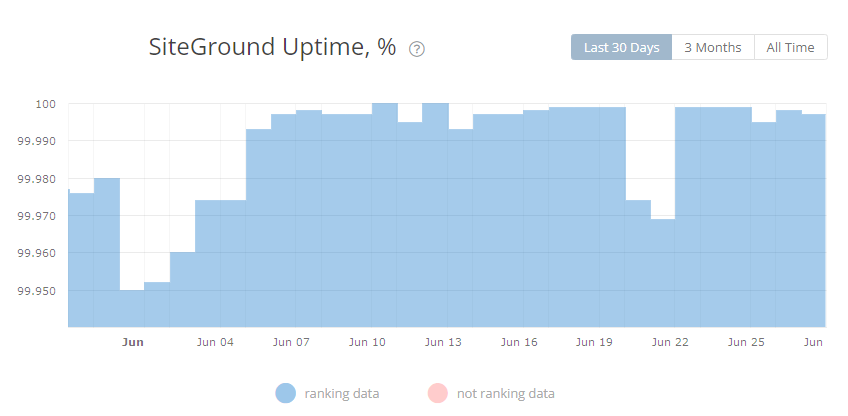| Review factor | Winner |
|---|---|
| Plans and pricing | SiteGround (4.5) |
| Features | Tie: SiteGround (4.5) / Bluehost (4.5) |
| Performance and uptime | SiteGround (4.8) |
| Security | SiteGround (5.0) |
| Support | SiteGround (5.0) |
| Improvements | SiteGround (4.8) |
| Best overall | SiteGround (4.7) |
SiteGround vs. Bluehost: Specs
| Password manager | Details | Basic plan features |
|---|---|---|
| Bluehost Overall rating: Read our full Bluehost review. | Starting price: $2.95 per month Hosting packages: Shared, WordPress, VPS, Dedicated |
|
| SiteGround Overall rating: Read our full SiteGround review. | Starting price: $2.99 per month Hosting packages: Shared, WordPress, WooCommerce, Cloud |
|
Our bottom line: You might not have expected this, but it’s a tie. Bluehost and SiteGround really shine in their own distinct categories, making them both premier choices for your web hosting provider. Here at Digital, though, we think Bluehost is just too good for most people to pass up.
Learn how we evaluated Bluehost vs. SiteGround, and check out our top-rated web hosting services below:
Plans and Pricing
Plans and pricing winner: SiteGround | |
|---|---|
| SiteGround (4.5) | Starts at $2.99 per month |
| Bluehost (4.0) | Starts at $2.95 per month |
In strict terms of pricing, Bluehost is cheaper than SiteGround. The lowest cost plan that SiteGround offers costs $2.99 per month and after the promotional rate expires that increases to an expensive $17.99. Bluehost’s most basic plan starts at $2.95 then increases to $11.99 per month after introductory pricing expires.
SiteGround unfortunately limits you to 10,000 monthly visits on its most basic plan, while Bluehost allows for 15,000. SiteGround does offer daily backups, which we like.
While nearly identical in plans and pricing, Bluehost offers plans that are more accessible to most users at the entry level, if not for pricing alone. Bluehost also offers VPS and Dedicated hosting. SiteGround does come in with Cloud and Reseller hosting plans, and that works well for more established brands and larger enterprises.
Ultimately, SiteGround’s price increases make it just to expensive for my taste.
Winner: Bluehost wins. It’s plans are cheaper and more straight-forward for most. And e-commerce sellers will appreciate Bluehost’s Online Store options.
Features
Features winner: Draw | |
|---|---|
| SiteGround (4.5) |
|
| Bluehost (4.5) |
|
Both Bluehost and SiteGround offer the industry-standard free custom domain name and SSL for the first year of use. Both providers offer their own versions of free website builders, free WordPress installation, and a free content delivery network (CDN).
SiteGround offers a custom Site Tools solution which is just as powerful as Bluehost’s cPanel. Bluehost also integrates the free version of Yoast SEO right in the backend, while SiteGround gives you daily backups and advanced caching of your site for free.
Bluehost does surpass SiteGround in the e-commerce department. Bluehost has features such an an email campaign creator, gift cards, shipping labels, and even appointment bookings that will have your e-commerce store active in mere minutes. The WonderCart let’s you sell even more of your products.
Plus, Bluehost has a lot of great site tools and add-ons you can’t find on SiteGround. Bluehost’s WonderTheme and WonderBlocks have also made getting your ideal website built without having to do much of the work.
Winner: Bluehost. Its e-commerce tools and features are beyond what SiteGround offers.
Performance and Uptime
Performance and uptime winner: SiteGround | |
|---|---|
| SiteGround (4.8) | 99.9% uptime guarantee |
| Bluehost (4.0) | No uptime guarantee, but testing shows 99.9% uptime |
Bluehost and SiteGround have exactly the same uptime guarantee. While a guarantee doesn’t ensure that your website will actually be up 99.9% of the time, what it does do is offer each company a target and an incentive to hit that target — most services will compensate you (typically in a credit on your next bill) for time lost if it falls below the guaranteed threshold.
According to our tests, SiteGround servers had an average uptime of 99.989% over the past 30 days, which is quite impressive. Throw in an extremely impressive 622ms response time, and you’ve got a great package of speed and reliability.
Bluehost isn’t shabby, but it doesn’t quite hit those high marks. Bluehost servers had an average uptime of 99.854% over the past 30 days, which is standard for the industry.
Winner: It’s a tie. Honestly, both Bluehost and SiteGround hit the industry standard. If you ever encounter a hosting provider that doesn’t, don’t use it.
Security
Security winner: SiteGround | |
|---|---|
| SiteGround (5.0) |
|
| Bluehost (4.0) |
|
Bluehost and SiteGround offer free SSL certificates, spam protection, and easy Cloudflare integration. But that’s about where the comparisons end, and SiteGround takes this victory.
In addition to the security protocols listed above, SiteGround also uses a combination of live human monitoring and various security tools to ensure its servers and your website are as safe as possible. All servers use the latest PHP version 7 with the latest security fixes, and SiteGround uses systems to block bots and attackers. SiteGround users also get Web Application Firewall WAF, a real-time monitoring system, an artificial intelligence (AI) anti-bot system, and free daily backups.
If you pick SiteGround, your website will be in safe hands.
Winner: SiteGround employs more security measures than Bluehost, taking away an easy win.
Support
Support winner: SiteGround | |
|---|---|
| SiteGround (5.0) |
|
| Bluehost (3.5) |
|
Bluehost and SiteGround offer 24/7 support through live chat in addition to phone support and an FAQ/Knowledge base. However, I’ve found that SiteGround’s support is more expert, efficient, and helpful.
While overall, Bluehost’s support seems good, its support chatbot made it difficult to reach a live person, and when we finally got into the queue for a support representative, it took a long time for a support rep to come online to help. In one instance, it took almost an hour over two chat sessions before we were able to get connected to a support technician.
On the other side, I contacted SiteGround’s support team several times to see how well the staff would respond. In each case, I got a quick reply, and the knowledgeable people seemed to want to help me. I called the team on the phone and used the live chat feature, with a positive experience each time.
Winner: SiteGround has best-in-class customer support and reps who go the extra mile to help you solve your problem.
Recent Improvements
Improvements winner: SiteGround | |
|---|---|
| SiteGround (4.8) |
|
| Bluehost (4.0) |
|
Of course, both Bluehost and SiteGround are always updating and improving services, including adding features, adding data center facilities, and providing more services. However, yet again SiteGround has the upper hand, with a host of generally more impressive features.
Bluehost’s partnership with Yoast is helpful, and new tools and management features are welcome. Bluehost does make an effort to improve its offering for those just getting started.
SiteGround also makes big, impressive additions that make it a real mover-and-shaker in the hosting space, like expanding a data center into Spain.
However, I was particularly impressed with some of Bluehost’s recent improvements such as the launch of Bluehost WordPress Academy, a set of online tutorials to help new users get the hang of how to host and build a website on WordPress.
Winner: With Bluehost making a serious push to improve e-commerce functionality and educational resources, this one lands as a tie.
Should You Get SiteGround or Bluehost?
Bottom line winner: SiteGround | |
|---|---|
| SiteGround (4.7) |
Best for: E-commerce website owners, those who run personal websites, local and regional small businesses, and hobby or enthusiast website builders |
| Bluehost (4.0) |
Best for: Local small businesses, entrepreneurs, e-commerce, and personal website builders |
Final Thoughts
Ultimately, this was a head-to-head matchup that was just too close to call. While SiteGround is slightly more expensive compared to Bluehost, it offers more in security and customer support. Bluehost is stellar for being affordable and packed with features that go just beyond your ordinary hosting.
here are valid reasons to choose Bluehost or SiteGround – either one could be the host that meets your needs best.
How We Evaluated SiteGround vs. Bluehost
I test web hosts based on the following factors:
Learn more about our review methodology.

